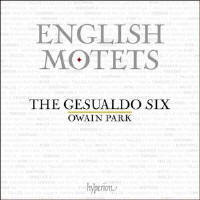Texte paru dans: / Appeared in: |
|
|
Outil de traduction ~ (Très approximatif) |
|
|
Reviewer: J.
F. Weber This is a wide-ranging collection of English motets from a period rather broadly characterized as the Renaissance. It stretches from John Dunstaple (c. 1390–1453) to Thomas Tomkins (1572–1656); the rest (except for Orlando Gibbons) are Tudor composers. Given the frequent collections devoted to the Tudor period, a selection like this widens the listener’s grasp of English sacred music. Only four works are set to English texts. Thomas Tallis and William Byrd are favored with three selections each. The notes treat the composers in chronological order rather than according to the arrangement of the program, where the works are presented for contrast. The notes are careful to distinguish William Cornysh of the Eton Choirbook from the younger composer of the same name (here assumed to be his son), to specify Robert White’s piece as the first of his four settings, and to identify John Sheppard’s two settings of Libera nos, salva nos, niceties that have eluded the annotators of some previous recordings.
Dunstaple has not shown up much lately, and until now this motet has come along once in a decade. It was on a recent Andrew Kirkman disc (Fanfare 41:1) on the same label, on Antony Pitts’s Dunstaple disc (29:5), on Alexander Blachly’s Musical Book of Hours (22:1), and on Orlando Consort’s Dunstaple program (19:5). Before that we have to go back to the Hilliard Ensemble’s Dunstaple disc (7:6 with discography), Bruno Turner’s with instruments (5:1), and Grayston Burgess’s also with instruments (reissue, 9:5). The cited discography includes four recordings not already mentioned. It’s one of the most important of Dunstaple’s shorter pieces.
The great Dunstaple isorhythmic motet is placed in the center of the program, while Tallis’s Suscipe quaeso, the longest work, rightly leads off the program, just as it is placed first in the Cantiones Sacrae of 1575. When David heard, the king’s lament for his son Absalom, was appropriately composed as a lament for Henry, Prince of Wales, the son of James I, who died young in 1612. It ends with exquisite softness. Byrd set only the first verse of Psalm 50 (51) for the Cantiones Sacrae of 1591, but his aching expression of David’s penitence for his sins ends just as beautifully. Solo verses, as in Tallis’s Loquebantur and alternately in White’s Christe, qui lux es, the Compline hymn of seven verses in the Sarum use, are faultless. The Cornysh anthem is the most frequently recorded work in the Eton Choirbook. The group of adult men, the third solo-vocal ensemble that I have reviewed for this issue, was founded in 2014 to sing Gesualdo’s Responsories for Holy Thursday, hence their name, in the chapel of Trinity College, Cambridge, the site of this recording. The titular six add another voice for the first and last pieces on the disc. The singers are typical of the best Oxbridge vocal ensembles. Chalk up another fine early music ensemble in the Hyperion stable. | |
|
|
|
|
Cliquez l'un ou l'autre
bouton pour découvrir bien d'autres critiques de CD |
|




